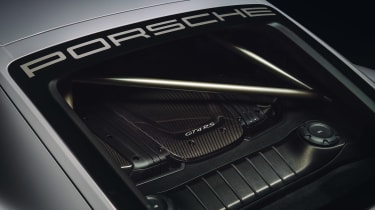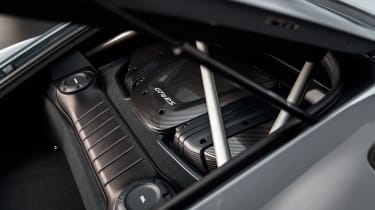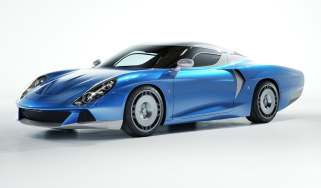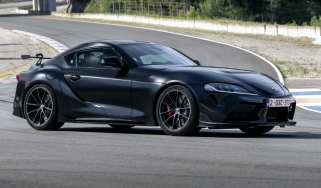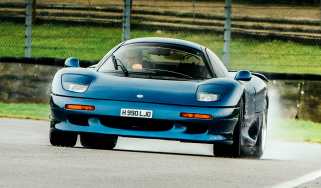Porsche 718 Cayman GT4 RS: new insights revealed
We reveal new insights into the Porsche Cayman GT4 RS after a conversation with Porsche GT boss Andreas Preuninger
The Porsche Cayman GT4 RS was officially revealed at this year's LA motor show, with Porsche’s GT division has answering our prayers by pairing the two-time eCoty-winnnig GT4 with the full-cream motor from the 911 GT3.
After seeing the car in the flesh and getting to speak with GT boss Andreas Preuninger, he revealed some fascinating new insights into the project, which has only increased our excitement about the latest RS model.
Powertrain and performance
Best to start with the GT4 RS’s most exciting element and that’s the engine. Replacing the GT4’s Carrera-derived engine is a 992-gen 911 GT3’s MDG.G naturally-aspirated 3996cc flat-six. Power and torque are marginally down compared to the GT3 with 493bhp (-9bhp) and 332lb ft (-14lb ft) of torque, but the figures are way up on the base GT4 with an extra 89bhp on tap and torque up by 22lb ft.
The creation of the GT4 RS has been made possible due to the complete redesign of the engine’s dry sump setup when evolving from 991.2 to 992. Back in 2017 the GT team built a one-off prototype that mated a 981 Cayman with a 991.2 GT3 engine, but it required substantial modifications to the body-in-white to fit the engine in. The culprit was the oil tank, so for the revised 992 GT3 engine – and with more than one eye on creating the GT4 RS – the system was redesigned with a more compact, composite tank, enabling the engine’s use in both cars.
The engine will also rev a full 1000rpm higher than the base GT4 to 9000rpm, and like all modern RS models it has a distinct intake system, which rather than just drawing air from the side intakes as in standard Caymans, now also draws air in from bespoke intakes that sit in place of the rear quarter glass. Fast-moving air is then piped through the cabin and down into an airbox that sits under a bespoke cover. The standard-fit titanium exhaust still houses gas particulate filters, but as proven in the GT3, Porsche has figured out how to make these work while not compromising on engine sound and volume.
The only differences between the engines in the 992 GT3 and the GT4 RS are the aforementioned intake system, which also sees the throttle body moved through 90 degrees compared to the GT3, and a completely different exhaust system. Compared to the 911’s installation, the GT4’s exhaust gases have to travel further in a more complicated system that has to avoid the rear driveshafts and also keep the centre section clear to maximise the efficiency of the rear diffuser. It therefore has increases in back pressure, although GT department boss Andreas Preuninger believes its more like 5hp down, rather than the 10bhp quoted.
He is emphatic in his denial that there is any ‘holding back’ of the mid-engined car: “We made it go as fast as possible on the ‘Ring’, is his straightforward response. Nevertheless, the GT4 RS is nine seconds a lap slower at the ‘Ring than the new GT3, but Preuninger is not concerned. “This is an RS, so it’s a Rennsport car, made for people who want to go to track days, but – more than other RS models – it’s a crossover with a driver’s car as well, because it’s very analogue, very entertaining, and it’s super shortly geared. Everybody has been complaining about the GT4, but with this car it revs to 9,000rpm in second gear and you’re hardly beyond 60mph. It’s really for having fun on the street. So we sacrificed maybe a little in track ability – maybe we could have gotten two seconds quicker on the ‘Ring – but we would have suffered big time on the road. Everybody that has driven this car says it’s super entertaining, and this is the number one thing that I want to say: it’s the emotion that it brings to the driver. It is dominated by intake noise, not exhaust noise like the GT3. In that car you have six cylinders going into one (outlet) and it makes this high revving, high frequency tone. This car is more like two three cylinder (engines) together, because we can’t link the exhausts due to the diffuser, and so it’s dominated by the intake noise which is so entertaining and better for the environment too.
The only available transmission is a seven-speed PDK dual-clutch, power of course being sent to the rear wheels via a limited-slip differential. Combined with a launch control function, acceleration to 62mph is down to just 3.4sec, 0.5sec ahead of a GT4 PDK and identical to a 992-gen GT3. Top speed is 195mph.
Modern-era RS models have become known for being available only with the PDK twin-clutch box. In the case of the GT4 RS, there is no obvious manual alternative. The regular GT4’s manual box can’t handle crank speeds of up to 9,000rpm and, as Preuninger admits with a wry smile, has received significant criticism for its long ratios anyway. The 992 GT3’s manual box is too long to fit, either. Don’t expect any manual equipped RS Touring – “that’s a 718 GTS 4-litre” says Preuninger.
Chassis and aerodynamics
As with most RSs, any extra power is extrapolated by having less weight to shift. The official DIN rating (that’s EU with a full tank of fuel) is 1415kg, making it 35kg less than a GT4 PDK and 20kg down on a 992 GT3 PDK. This weight loss certainly helps the GT4 RS match the more powerful GT3 on paper, but it’s still a remarkable achievement considering the GT3’s extra rubber on the road and inherent traction advantage driven by the engine being sat directly on the rear axle.
The GT4 RS’s core suspension hardware is essentially the same as on lesser GT4s, so that’s McPherson struts all-round, but the setup and geometry is bespoke compensating for both the extra performance and extra downforce the GT4 RS has on tap. The car itself sits a further 30mm lower than a base 718 Cayman, while standard-fit adaptive dampers have unique flow rates, and there are modified spring rates and new anti-roll bars too.
The GT4’s aero package is also much more substantial, being dominated by a larger rear wing mounted on new swan-neck supports and bespoke front wings with top-vents and a subtle reshaping of the front arch itself that helps reduce air pressure and therefore lift. Porsche is quoting a 10 percent increase in downforce in road mode, but this rises to 60 percent when in Performance mode, which is only able to be selected on-track.
Both the front wings and the bonnet are constructed from carbonfibre reinforced plastic, the weight saving goes so far as to replace the enamel and plastic badges with stickers. Porsche has also confirmed an optional Weissach Package will be available for an extra £8913, which builds on the standard specification with exposed carbonfibre finishes on the bonnet, intakes, airbox cover and rear wing. A similar magnesium wheel design as found on other RSs are also available, but they need to be specified on top of the Weissach Package for an extra £10,521 – a new design of forged aluminium wheel on Cup 2s are otherwise standard.
The interior is resolutely stripped of excess, with Porsche’s Race-Tex material covering most interior surfaces including the dash, steering wheel, door cards and roof lining, while the GT bucket seats are also available with a unique blue inner lining. Porsche has also fitted a titanium half-cage behind the driver that’s partially visible through the rear glass.
Prices
Prices for the new GT4 RS will start at £108,370, a close sum to a GT3, but like all new cars from the GT division the issue will not be if you have the money to buy one, but whether you can secure a build slot. Away from the inevitable battle to get hold of one, the fact Porsche has finally relinquished its frustrating reluctance to really push the mid-engined Cayman to the limit of its capability is something to get excited about, even if it might suggest the end is nigh for Porsche’s mid-engined sports car.



